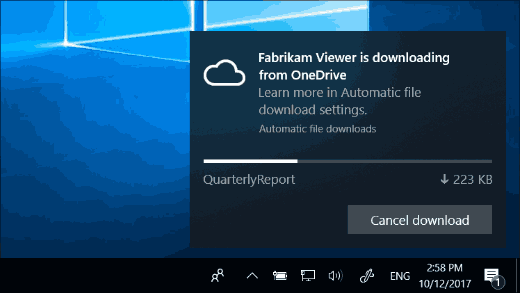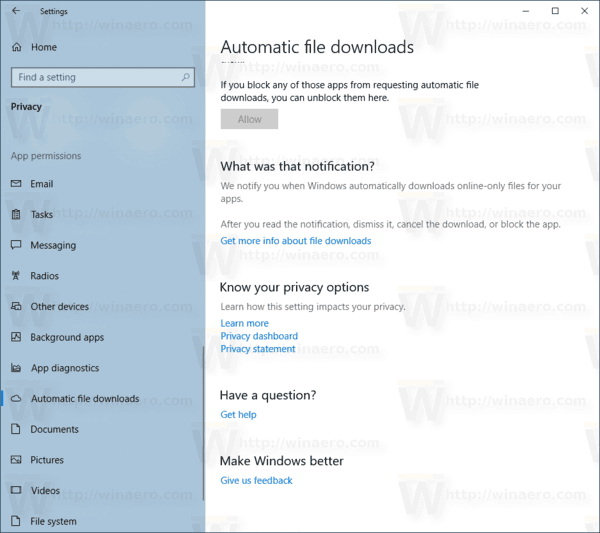When you use an online storage provider such as OneDrive to store online-only files, some Windows apps might download these files automatically. For example, a music player app such as Windows Media Player might download your online-only music files to play them. You can block certain apps from downloading your online files automatically.
Advertisеment
When an app downloads online-only files, you'll get a notification that shows where it's downloading them from and how many it's downloading, as well as the download progress.

Block Automatic File Downloads for Apps in Windows 10
When you get these notifications, do one of the following:
- Do nothing, or dismiss the notification. If the download is expected and all's well, let the notification go away on its own after the download completes. Or, select the arrow in the upper right of the notification to move it to action center.
- Cancel the download. To put the brakes on a download that's already started, select Cancel download, then select Cancel download again to confirm.
- Block the app. Don't want the app to download online-only files? Select Cancel download > Block app to cancel the download and block the app from downloading online-only files again in the future.
Note: Blocking apps could make them unstable. If you trust an app and open online-only files with it frequently, don't block it.
Unblock Apps You Previously Blocked
- Open the Settings app.
- Go to Privacy > Automatic file downloads on the left.
- On the right, click on the Allow button. This will ublock the Automatic File Downloads feature for all blocked apps.

Note: If the Allow button is not accessible(grayed out), this means that you have not blocked any app from requesting automatic file downloads.
Related articles:
- Disable Advertising ID for Relevant Ads in Windows 10
- Disable Improve Inking & Typing Personalization in Windows 10
- Disable Privacy Settings Experience at Sign-in in Windows 10
- Disable App Access To Messaging In Windows 10
- Disable App Access To Email In Windows 10
- Disable App Access To Call History In Windows 10
- Disable App Access To Contacts In Windows 10
- Disable App Access To Location In Windows 10
- Disable App Access To File System In Windows 10
- Disable App Access To Account Info In Windows 10
- Disable App Access To Calendar In Windows 10
- Disable App Access To Microphone In Windows 10
- Manage App Access To Documents, Pictures, and Videos In Windows 10
Support us
Winaero greatly relies on your support. You can help the site keep bringing you interesting and useful content and software by using these options:

This doesn’t work for the very example given above, “Windows Media Player.” Clicking “Block” has no affect and it doesn’t appear in the Registry. Also, the article says that it only works for Store apps. Either that’s wrong (which it might be, because Store apps don’t generally interact with the Registry) or it’s unrelated to Windows Media Player, which is not a Store app.